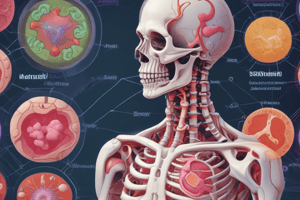Podcast
Questions and Answers
What is the primary purpose of ordering a blood calcium test?
What is the primary purpose of ordering a blood calcium test?
- To diagnose thyroid disorders
- To diagnose only parathyroid disorders
- To diagnose only kidney diseases
- To diagnose and monitor a range of conditions involving bones, heart, nerves, kidneys, and teeth (correct)
Which panel includes a total calcium level as a part of a routine health screening?
Which panel includes a total calcium level as a part of a routine health screening?
- Electrolyte Panel
- Basic Metabolic Panel (BMP)
- Comprehensive Metabolic Panel (CMP) (correct)
- Complete Blood Count (CBC)
What will an abnormal total calcium result indicate?
What will an abnormal total calcium result indicate?
- An underlying problem (correct)
- Normal kidney function
- Normal parathyroid function
- A healthy individual
Which of the following is responsible for maintaining calcium concentrations in the blood?
Which of the following is responsible for maintaining calcium concentrations in the blood?
What can measuring urine calcium help determine?
What can measuring urine calcium help determine?
What is the significance of the balance among calcium, PTH, vitamin D, phosphorus, and magnesium?
What is the significance of the balance among calcium, PTH, vitamin D, phosphorus, and magnesium?
What is the main reason why monitoring calcium levels is necessary for people with certain kinds of cancer?
What is the main reason why monitoring calcium levels is necessary for people with certain kinds of cancer?
What is the primary difference between total calcium and ionized calcium tests?
What is the primary difference between total calcium and ionized calcium tests?
What is the relationship between calcium levels and protein levels in the blood?
What is the relationship between calcium levels and protein levels in the blood?
What is the purpose of measuring ionized calcium levels in people with muscle spasms and numbness?
What is the purpose of measuring ionized calcium levels in people with muscle spasms and numbness?
What is the role of PTH and vitamin D in regulating calcium levels?
What is the role of PTH and vitamin D in regulating calcium levels?
Why is it necessary to measure free calcium directly in some cases?
Why is it necessary to measure free calcium directly in some cases?
What is the significance of calcium levels in people with kidney disease?
What is the significance of calcium levels in people with kidney disease?
What is the relationship between calcium levels and bone health?
What is the relationship between calcium levels and bone health?
Flashcards are hidden until you start studying
Study Notes
Blood Calcium Test
- Ordered to screen, diagnose, and monitor conditions related to bones, heart, nerves, kidneys, and teeth
- Used to diagnose parathyroid disorders, malabsorption, and overactive thyroid
Total Calcium Level
- Often measured as part of a routine health screening
- Included in the comprehensive metabolic panel (CMP) and the basic metabolic panel (BMP)
Abnormal Calcium Results
- Indicator of an underlying problem
- Additional tests are often done to measure:
- Ionized calcium
- Urine calcium
- Phosphorus
- Magnesium
- Vitamin D
- Parathyroid hormone (PTH)
- PTH-related peptide (PTHrP)
Calcium Regulation
- PTH and vitamin D maintain calcium concentrations in the blood within a narrow range of values
- Measuring calcium and PTH together helps determine parathyroid gland function
- Measuring urine calcium helps determine if kidneys are excreting the proper amount of calcium
- Testing for vitamin D, phosphorus, and/or magnesium helps determine other deficiencies or excesses
- Balance among these substances is important for diagnosis
Ionized Calcium Test
- Ordered when symptoms include numbness around the mouth and in the hands and feet, and muscle spasms in the same areas, which may indicate low levels of ionized calcium
- Also ordered for individuals with certain types of cancer (breast, lung, head and neck, kidney, or multiple myeloma), kidney disease, or kidney transplant recipients
Calcium Monitoring
- Necessary for individuals with certain types of cancer, kidney disease, or kidney transplant recipients
- Monitoring is also necessary when treating abnormal calcium levels to evaluate treatment effectiveness (e.g., calcium or vitamin D supplements)
Urine Calcium Test
- Ordered when symptoms suggest kidney stones, such as sharp pain in the side or back around the kidneys, pain radiating to the lower abdomen, and/or blood in the urine
Calcium Regulation
- Calcium absorption, use, and excretion are regulated by a feedback loop involving PTH and vitamin D
- Disruptions to calcium regulation can cause inappropriate acute or chronic elevations or decreases in calcium levels, leading to hypercalcemia or hypocalcemia
Calcium Tests
- Total calcium test measures total calcium levels in the blood
- Ionized calcium test measures free calcium levels in the blood
- Total calcium test results can be affected by high or low levels of protein in the blood
Calcium Results Interpretation
Normal Calcium
- Normal total or ionized calcium result indicates normal calcium metabolism and regulation
High Total Calcium (Hypercalcemia)
- Can be caused by hyperparathyroidism (benign tumor of the parathyroid gland) or cancer (spreading to bones or producing a hormone similar to PTH)
- Hypercalcemia can be mild and present for many years before being noticed
Studying That Suits You
Use AI to generate personalized quizzes and flashcards to suit your learning preferences.




